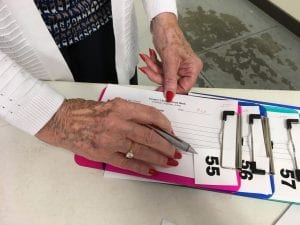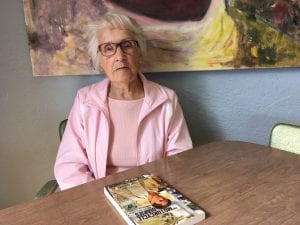When people come to the Greater Chehalis Food Bank, the first face they probably see is that of Mazie Schlickeiser, a member of the food bank board and a weekly volunteer. Although the only thing she will say about her age is that she is over ninety, Mazie adds, “I’ve been here forever.”
If you do the math, Mazie donated 63 years of her life to volunteering beginning in 1955. She was born in North Dakota and lived in Illinois. Her husband Bill, now deceased, was born in California. They met in Seattle through a common friend in the late 1940s and married in 1949. “I was just a teenager,” Mazie says.

The couple moved to St. Charles, Illinois where Mazie got involved in her first volunteer project in 1955 when she read about the plight of Navajo Indians living on reservations. Working through a women’s service group, Mazie decided it would be a good volunteer project.
During a visit to the reservation, Mazie found that living conditions were horrible. Hogans, the traditional dwelling of the Navajo people, were built of mud, wood and clay. Floors were muddy and food was cooked in a communal pot with smoke ventilated through a hole in the ceiling. Blankets provided the only insulation.
The women gathered 20,000 pounds of goods for the reservations, too much for such a small group to send. They appealed to a Chicago Sun-Times writer and he found a Navajo freight line that would ship it.
They did that for several years until some boxes were dropped off at a little mission manned by two couples. Each couple had seven adopted Native American children, the most they could legally adopt. They asked if they could keep the boxes instead of passing them on to reservations.

One of the families came to visit the Schlickeisers who were sponsors of a little Native American girl named Jenny. They sent her packages filled with items she needed, and she responded with letters through the years. About three years ago Jenny came to visit Mazie. “She is now grown, married and has grandchildren,” she says.
“Life has changed for them, for the better,” Mazie says. Not many Native Americans live in hogans anymore. Now they live in small homes. Those that leave the reservations for college education are coming back to help those still at the reservations.
While the Schickeisers lived in St. Charles, Mazie organized a group involved in the rescue of abused and abandoned animals called Homes for Endangered and Lost Pets (HELP). She enjoyed taking cats and kittens home with her because she had the room to take care of them. They were adopted out of her home so she could match the cat with its new owner.

Eventually, the Schlickeisers moved back to the Northwest in 1990 when Bill and Mazie retired. “It always seemed like home to me here,” Mazie says. It was easy for them to get involved when they moved because they had always been busy. They joined Optimist International because of the club’s projects. Teaching youth at church was also fun for both Mazie and Bill.
An advertisement for someone who knew about computers drew Mazie into helping with tax aid at the Timberland Regional Libraries. They wanted someone to manage the tax program, not necessarily someone to help fill out the tax forms. As a certified tax aid provider with AARP Mazie was over-qualified.
She met with the person who had overseen the program and as her car filled with boxes of forms Mazie asked, “When do we meet again for training?” She was told, “This is it.” So Mazie taught herself. She’s gone from doing everything on paper to doing everything online. There are no more books to consult for answers. “It’s easier but harder,” Mazie says. “It takes a lot of work.”
Bill was originally approached about volunteering at the food bank. A member of the Moose Club who worked with the food banks invited Bill to help. In 1996 both Bill and Mazie got involved. Soon the little brick building on Market Boulevard filled with food for the Chehalis Food Bank, the Lewis County Food Bank Coalition and eight other branches throughout the county.

As the treasurer on the board of the Greater Chehalis Food Bank, Mazie worked on the design for the new food bank on 21st Street. The building was built by donations and is operated by volunteers. She spends three hours there every Friday handing out forms to the food bank patrons.
Now that Bill passed in 2008, Mazie is as busy as ever. How does she keep going into her nineties? “The more active you are, the better you age,” Mazie says. “You have to keep your mind as active as your body and probably more so. Try something different. Instead of saying, ‘I don’t like it,’ just try it.”














































